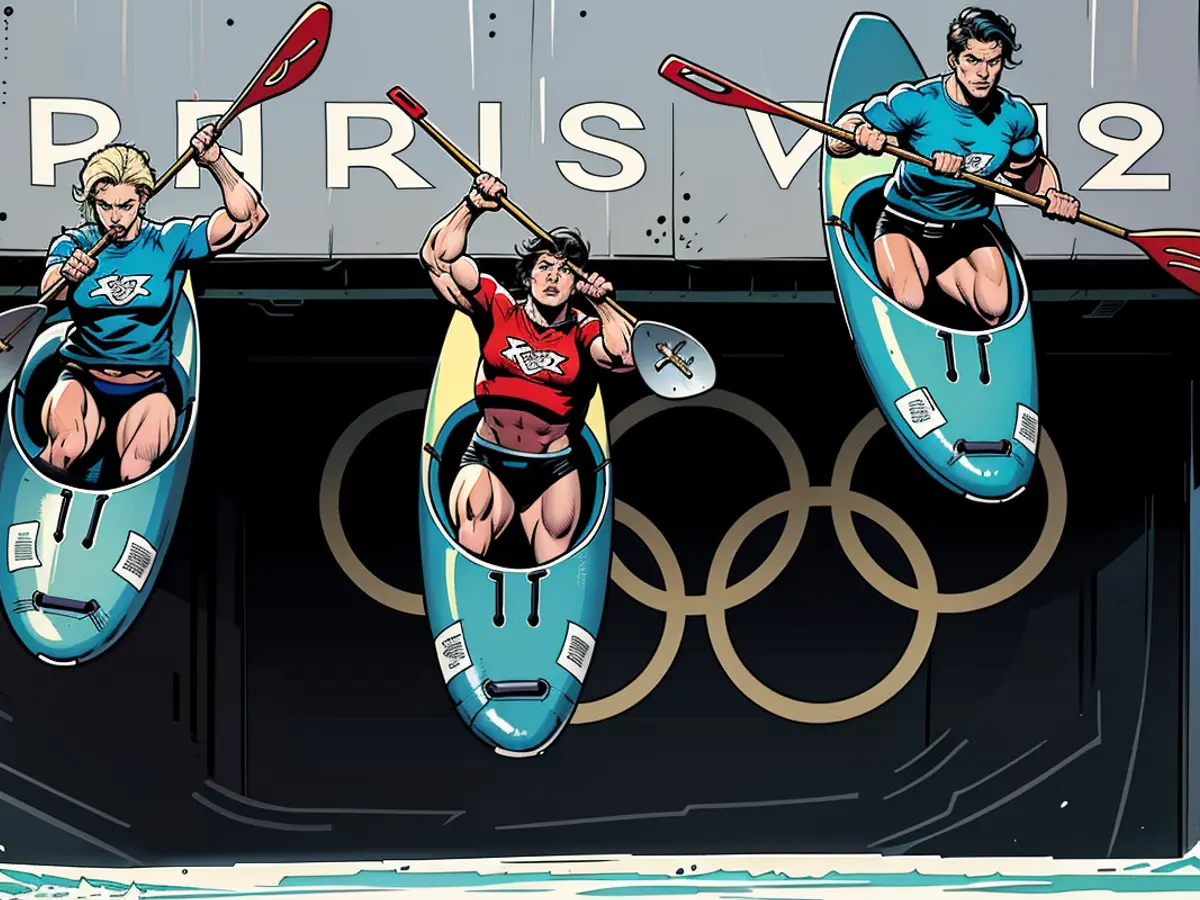Three Germans fight for gold in new action water sport
Elbow to Elbow: For the first time, there's a contact race in the whitewater channel with a spectacular starting ramp. Three Germans have qualified for the finals to compete for the medals. This new Olympic sport offers thrilling action.
Whitewater canoe slalom is already spectacular enough - and it was a magnet for spectators in the first days of the Paris Summer Games at the Stade Nautique in Vaires-sur-Marne. But it gets even better. The new discipline of kayak cross has all the advantages that the Olympic organizers value: TV-friendly, modern, action-packed, exciting. It's not just about racing against the clock, but also against each other for victory. "We have to bring out our elbows," said Ricarda Funk, before her Olympic debut in this discipline.
Stefan Hengst described the premiere as "a great show." However, he will not be part of it when it comes to the medal race on Monday afternoon. He failed to qualify in the preliminary round. Noah Hegge, the silver medalist in the canoe, Elena Lilik, and Ricarda Funk, on the other hand, are in the quarterfinals. The atmosphere is expected to be similar to that of the traditional disciplines in the whitewater channel. Both men and women have both starters qualified for the final day, all four have won their preliminary rounds and are among the medal contenders. "The French will be cheering from the tribune," Ricarda Funk is sure.
When the ramp's gate opens, the four kayaks first drop three meters into the water. Not a big deal, according to Pohlen, the German Canoe Association's head coach for canoe slalom. "It looks spectacular," but it's just a matter of practice. The key is to get into position to then, once you're in the water, "gain speed and get away from the opponents" after the starting phase. This doesn't always happen - and that's part of the appeal of the sport, "that you sometimes have to deal with another driver at a gate," says Pohlen. Ricarda Funk seems to be getting used to the format. "It's inevitable that you'll sometimes get a paddle in the face or a boat's bow in your ribs. That's not very cool," she says. Nevertheless, she describes the head-to-head racing as "an enrichment."
You never know what will happen
Kayak cross is new to the program, but not a new discipline. It's been around for nearly a decade, previously known as boater cross or extreme kayak. The boats are shorter and more maneuverable than in classic canoe slalom, and the gates can be touched in this discipline. The elements are similar, but there are only six downstream and two upstream gates to conquer, making the course shorter and easier for spectators at the Stade Nautique to follow. Additionally, there's a kayak roll, a 360-degree underwater spin, which is not present in the classic whitewater course. "You never know what will happen," said the British kayaker Kimberley Woods. "You have to deal with everything that comes your way while trying to stay error-free and fight against the other boat." Woods has won one of the first World Championship titles awarded. Elena Lilik emphasizes the need for "tactical awareness." "It's not just about physical strength and body contact, but you also have to be mentally present and make the right decisions as quickly as possible."
The German slalom canoeists only truly engaged with the new discipline of "Canoe Slalom" when it was decided in 2021 that it would be included in the Paris Olympics, according to Pohlen. There is no dedicated national team for this discipline, and thus no specialists. "We took the people who were already competing in Canoe Slalom," says Pohlen, explaining that this was the most practical approach. This includes a Canadian-style specialist like Elena Lilik, who Pohlen notes is also skilled in kayaking, which gives them an advantage over some other nations that don't have enough kayakers in their teams. "But for the next Olympic cycle, we need to consider how we will proceed."
Pohlen understands the arguments for Canoe Slalom. "It's easier for spectators to understand," he says, because it's clear who has won if they haven't made any mistakes and incurred penalty seconds. And with "lighter" sports, he says, "you hope to score points with the IOC." However, he doesn't understand why standardization like the color of the boats was insisted upon. The athletes and athletes were not thrilled, according to Pohlen, about having to buy new boats for the Olympics. "If it's going to be younger and wilder, then you have to give the youth a bit of freedom and individuality."
The Olympic Games 2024 in Paris will undoubtedly feature exciting kayak cross competitions, as this new discipline will be incorporated into the whitewater channel events. This event promises to be as thrilling as the traditional canoe slalom races, with its unique head-to-head racing format and unpredictable outcomes.
With the Olympic Games 2024 in Paris approaching, the German slalom canoeists are gearings up for the new discipline of kayak cross, which they have only recently started engaging with, having seen its inclusion in the Paris Olympics in 2021.








